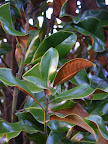
January gardening chores in my Massachusetts garden have always been limited to reading gardening books and catalogs in front of the fireplace. This year however the invasion of Cardamine hirsute commonly known as hairy bittercress has forced me out of my cozy chair and believe it or not into my garden. Cardamine hirsuta is a winter annual that is native to Europe and Asia, but has also found its way into North American gardens primarily by way of nursery potting soil. It germinates in autumn and sticks around through the winter as a basal rosette with pinnately compound leaves as in the above photo taken a few days ago. This herb is a member of the mustard family (Brassicaceae) and although it is said to be bitter it is an edible green and has been used as a cover crop. My zone 7 humid, wet garden provides everything this plant might desire. Cardamine hirsute typically flowers sporadically in the fall, then again from late winter through out spring, but this past year I had a third (not unheard of) generation of plants in early to mid July. Small white flowers sit on top of short six to eight inch wiry green stems, these flowers go to seed and ripen at different times so by the time you have spotted your first white flower there may have been ripened seeds already dispersed throughout your garden. The seed of Cardamine hirsuta like many other mustard family plants will burst explosively, when touched, sending the seeds flying far (three to four feet) from the parent plant, and it can set seed a few days after flowering, because of this the best time to remove this dastardly plant is prior to late winter. Pulling this weed in the garden is not difficult but it has begun to take over my front lawn, I have daffodils scattered through out this area so I have in the past delayed mowing until mid spring this allowed the life cycle of Cardamine hirsute to flourish. This year I hope to have the have lawn mower out as early as the end of March, bag and dispose the clippings rather than risk throwing them into the compost pile. Yes a hot pile will kill the seeds but this plants design to set seed is so ingenious that it can ripen it’s seed after the plant has been pulled from the ground, with determination like that I won’t be taking any chances.



No comments:
Post a Comment